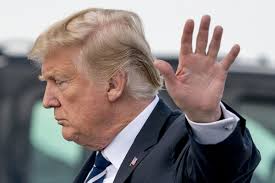
Is the president above the law?
This is the question of the day given Donald Trump’s recent tweet that he has “the absolute right” to pardon himself in the event Robert Mueller charges him with obstruction, collusion, or other such crime. According to the New York Times, this is yet more evidence that Trump “confuses the role and powers of the president with those of a king.” But is it really so cut-and-dried?
Thanks to America’s complex and contradictory political structure, it isn’t. Under the British constitution, to which the US is often compared, “her majesty’s government” is indeed above the law in the sense that it is the source of law rather than the object. If the House of Commons decrees that everyone must wear plaid on Sundays, it would not be unconstitutional for the simple reason that the “crown-in-parliament,” i.e. the union of the crown, lords, and commons, is the highest authority in the land and hence there is no supreme court or other such body to contradict it. Britain’s unwritten constitution gives Parliament a perfect right to make a fool of itself if it so pleases, and no governmental authority is empowered to say otherwise.
Things are not so clear here in the US where Congress makes a fool of itself on a daily basis and no one seems to care. Unlike Britain, no one is in charge in the US for the simple reason that America’s founders rejected the concept of sovereignty in toto. Thus, while the Constitution might seem to be the final authority, Article V says that “we the people” can change it, which suggests that it’s the citizenry that’s really on top. But since the Constitution at the same time severely curtails the people’s amending power, the people are not fully in control either. During the glory days of the Warren court, liberals considered it an article of faith that the Supreme Court was the highest authority since its job is to interpret what the Constitution says. But Lincoln successfully defied the Supreme Court in Ex parte Merryman (1861) by suspending a Confederate sympathizer’s right of habeas corpus while FDR threatened to undermine it by packing it with liberal appointees. Congress would seem to be on top since it can impeach a president and a Supreme Court justice to boot. But impeachment is so arduous and ineffectual that congressional supremacy is similarly a mirage.
No one’s on top. So the real question is not whether Trump has an absolute right to pardon himself, but whether anyone has the constitutional power to stop him. The answer is no. The Supreme Court can’t act without backing from Congress, and Congress won’t act because Republicans can be counted on under anything like current circumstances to stop impeachment in its tracks. We the people can punish Trump by voting him out of office except that the Electoral College, thanks to mounting disparities in state populations, shows an increasing tendency to substitute its judgment for that of the population at large.
Thus, the president is not above the law or under it, but somehow in between. This is a dangerous ambiguity that the people should clear up as quickly as possible in the interests of democratic self-government. But since the Constitution effectively declares itself to be unchangeable – remember, Article V allows just thirteen states representing as little as 4.4 percent of the population to veto any amendment – the people are constitutionally prevented from putting their own house in order. The problem is therefore unfixable. While the Times rages and fumes, Trump tweets happily away as a consequence, confident that he can do as he likes without anyone getting in his way.
If the president defies the law and no one is empowered to stop him, is it really unconstitutional? Put another way, does a fatally flawed Constitution not only allow, but fairly invite the president to behave in a way that is increasingly dictatorial?
The answer for once is unambiguous: yes.
